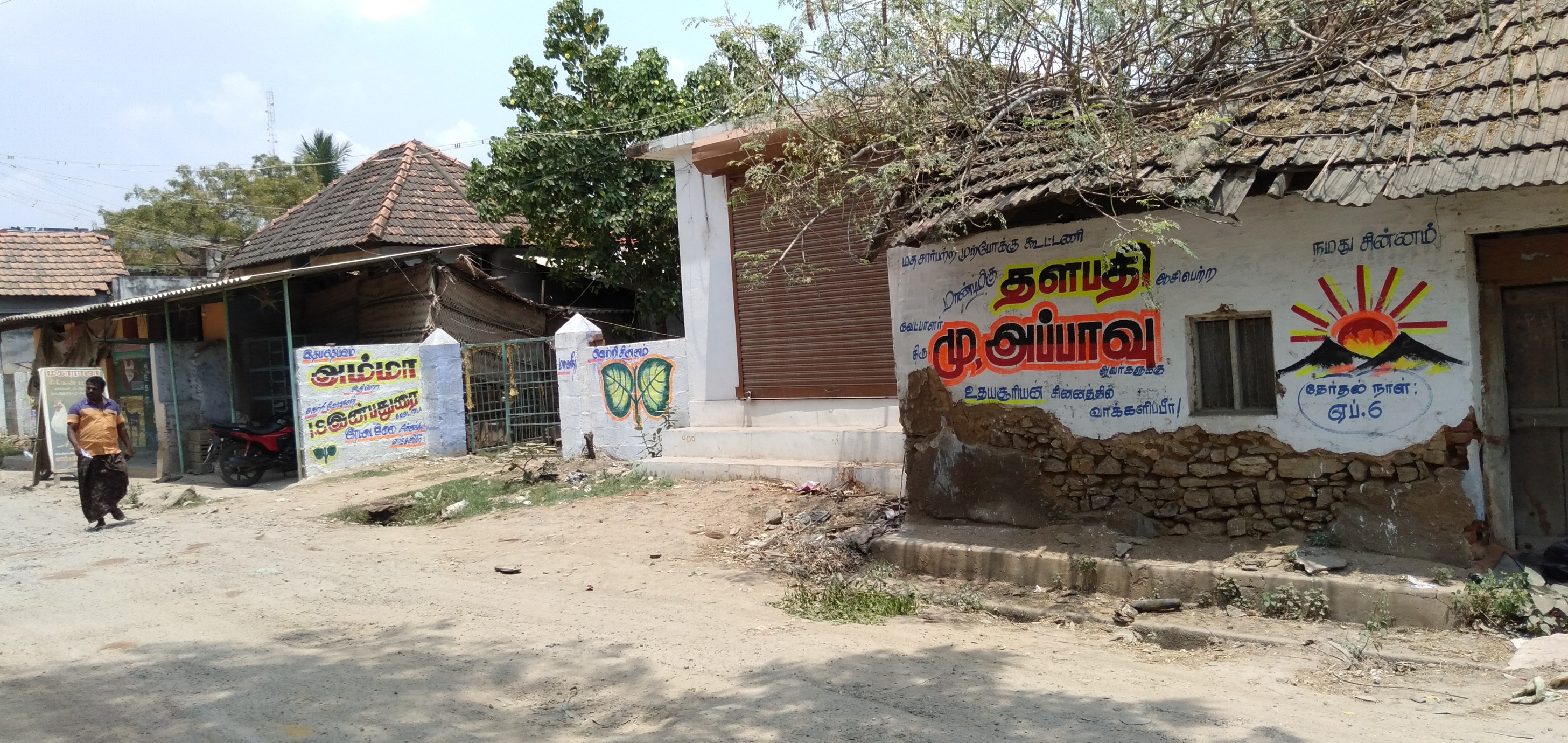
DMK takes a cue from Appavu tale; closely monitors postal ballot process
It is business as usual at the Radhapuram constituency in Tirunelveli district. But, there is plenty of political action happening behind-the-scenes ahead of the upcoming elections in this constituency. This is largely because the DMK candidate, M Appavu, who had lost the last Assembly elections here in 2016 by just 49 votes to his AIADMK opponent, had gone to court alleging rejection of some postal ballots. This case has prompted the DMK party to be more vigilant and monitor any irregularities with postal ballots at voting booths in the 2021 Assembly election.

It is business as usual at the Radhapuram constituency in Tirunelveli district. But, there is plenty of political action happening behind-the-scenes ahead of the upcoming elections in this constituency. This is largely because the DMK candidate, M Appavu, who had lost the last Assembly elections here in 2016 by just 49 votes to his AIADMK opponent, had gone to court alleging rejection of some postal ballots.
This case has prompted the DMK party to be more vigilant and monitor any irregularities with postal ballots at voting booths in the 2021 Assembly election.
However, the general mood in this constituency is perceptibly not in favour of the current AIADMK MLA Inbadurai. According to Kalyanasundaram, an autorickshaw driver and an ardent AIADMK supporter, Inbadurai had bifurcated the taluk office here and opened one in his hometown Thisayanvilai.
“Before the taluk office bifurcation, Radhapuram received many people and the region was brimming with business activities. But now, it has all gone,” he said, adding that the sitting legislator focused on developing his hometown and did nothing for us these last five years.
If not for the lawyers and their protest, Inbadurai would have also taken the court to Thisayanvilai, sarcastically added this AIADMK supporter.
Also read: In TN’s deep south, marginalised Pallars wooed by BJP stay divided
Sumathi, a soft drinks seller is also unhappy with the bifurcation of the taluk office. It had brought down her earning from ₹500 to ₹200 per day.
The DMK contestant M Appavu who had lost the previous Assembly elections in this constituency just by 49 votes to Inbadurai, seems to enjoy the support of the people here.
“Appavu was an MLA four times. It was because of him, we got a bus stand, drinking water supply and good roads. He is affable and we can meet him anytime. But it becomes hard even for AIADMK party functionaries to meet Inbadurai. Though I am a AIADMK supporter, I can say that Appavu will win from here with a greater margin in this election,” said Ayyappan, a resident.

Following his defeat in the elections, interestingly, Appavu had filed a petition alleging that the Returning Officer had rejected some of the postal ballots. And, he had demanded that the 19, 20 and 21 Rounds of votes in the electronic voting machines (EVM) must be recounted since it had not been done as per stipulated rules.
The case continued for years and it has moved to a critical phase now. In 2019, the Madras High Court ordered a recount but Inbadurai quickly moved a petition to stay the process. Hearing the petition, the Supreme Court had declared that though the recounting can be done, the results should not be announced.
With the 2021 state Assembly elections around the corner, the case has come up for hearing recently on March 16. The recounting report was unsealed and out of 203 postal ballots counted, 153 was polled for Appavu, 6 for Inbadurai and 44 was rejected.
This result reportedly makes Appavu the victor in the last mandate. However, the court has asked the parties to submit a two-page synopsis on this issue by March 23.
Also read: Congress gets 25 seats in DMK’s Tamil Nadu alliance deal
Election war room
It is in the backdrop of this case, the DMK has set up an election war room to prevent any irregularities and monitor the constituencies at the booth levels.
“The concept of an election war room was conceived by our leader M K Karunanidhi in 2016, by roping in the lawyers’ wing of our party. In the 2019 Parliamentary elections too, the war room functioned. This time we have created district level war rooms,” informed NR Elango, senior advocate and Rajya Sabha MP.
The DMK has 77 party districts and each has a centralised war room. This election, the party has set up war rooms at the constituency level, the jurisdiction’s police station level and polling booth level.
“Under each police jurisdiction, there are about 40 to 50 polling booths. In some areas, a same booth has been divided into 160 and 160A. For each booth, we have booth level agents – 2 (BLA-2). The DMK is the only party which has appointed BLA-2 for all the 80,000 odd polling booths and their names and contact details have been uploaded on the Election Commission of India (ECI) website,” said Elango, adding that about 2,600 lawyers have been given the responsibility of running these war rooms.
Also read: In Bodinayakanur voters root for OPS, DMK’s Tamilselvan on the backfoot
A separate app has been developed for better coordination among the war rooms, he added.
“The app can be used to send photos and videos of any malpractices or violation of the election Code of Conduct by the Opposition parties, etc., and then we will raise a complaint with the ECI. Similarly, our team of lawyers were physically present during the first level of EVM checks. All these initiatives have been undertaken with zero expenses,” added Elango.
Educating booth agents
In addition to the war rooms, one of the election strategist groups in the state organised an awareness programme for the party booth agents, on how to prevent any malpractices with postal ballots.
Earlier, the postal ballots were permitted only for government officials involved in election duty and armed forces personnel. But this time, the voters who are 80 years and above, have been given the opportunity of casting their vote through post.
One group member said that the major problem here is that it would be difficult to cross-check whether a voter is actually 80 years or above by just going through the voters list.
“Sometimes, the voter’s date of birth in the voter ID and the age in photo identity cards such as Aadhaar vary. So, there are chances that booth agents of political parties can misuse this right. A person below 80 years can do postal voting and come to the polling booth on election day to cast his/her vote for the second time,” he said.
Also read: Will powerful Kallars in southern TN decide fate of AIADMK?
In order to prevent this malpractice, booth level officers (BLO) have been told to visit each booth and find out the voters who are 80 years and above. They will have the list of voters who are above 80. The voters will be given Form 12D and asked to sign, whether he/she is interested to cast their vote through post.
“Even if the voter doesn’t show an interest to do postal vote, he/she must sign the form. But the problem is, in many places the BLOs are lethargic in getting the forms signed,” the member said.
Once the forms are submitted to revenue divisional officials (RDO), they remove the names of voters who are interested to cast postal votes from the final voters list. And, it is this list which will be used in the polling booths on election day.
“In some places, the names are not removed leading to double-voting. That is why after the names are removed, party booth agents will now get the final voters list from the RDOs through the party lawyers,” said the member.
With that list, the booth agents will ensure that a voter who consented to postal voting is present in his or her place on the days allocated for them to vote.
“They are given two chances to cast the postal vote but if they lose both chances, then the BLOs may favour a party by misusing the postal ballots,” the member added.
The forms have been distributed between March 12 and March 16. The final voters list and the list of voters who had opted for postal voting should be distributed to booth agents between March 27 and March 30. Postal voting takes place between April 1 and April 5, the member said.
Also read: Tamil Nadu’s interim budget: Big promises, unwanted projects
Meanwhile, Elango pointed out that there are about 19 lakh voters, including both differently abled and the people above 80 years, who are eligible for postal voting.
However, according to him, as of now, only 1.5 lakh voters have opted for postal ballots.
“Earlier, the ECO used the word ‘may’ while giving guidelines on the date and time of the visit of polling officials to facilitate postal votes. After the representation given by all the political parties, the word has been changed to ‘shall be’. So the candidates shall be informed about the visit schedule for the delivery and collection of postal ballots. During this process, the party BLAs can also present and thereby prevent any kind of tampering of the votes of threatening the voters,” he explained.
In some way, it seems the Radhapuram constituency in Tirunelveli district has brought the spotlight on postal ballots in this 2021 Tamil Nadu Assembly election.


